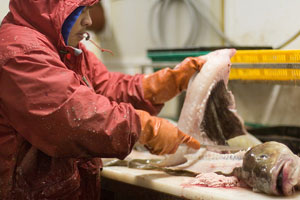Seafood Processor (At-Sea)
Tasks & duties

- sort the fish
- skin fish using a trio (skinning) machine
- fillet and trim fish to specific requirements
- weigh the fish and pack it into cartons
- weigh the cartons of fish to ensure they are the correct weight
- ensure the quality of the fish remains high
- clean the trimming and packing line with sanitising chemicals
- maintain the machinery
- test fish for correct temperature, control hot and cold gases, and defrost freezers
- help to unload and load the boat.
Skills & knowledge

- knowledge about different species of fish and how they are processed
- good knife-handling skills for filleting and trimming fish
- skill sorting, weighing and packing fish
- the ability to stack a freezer
- the ability to operate and clean the machinery used for seafood processing
- an understanding of safety, health and hygiene regulations
- good people skills as they may work and live with the same people on a boat for at least six weeks.
Entry requirements
There are no specific educational requirements to become an at-sea seafood processor. However, relevant training or a qualification, such as a Certificate in Seafood Technology, is preferred by some employers.
Training on the job
While working, at-sea seafood processors can take Level 2 to Level 4 unit standards towards the National Certificate in Vessel Operations (At-Sea Processing) offered by the NZ Seafood Industry Training Organisation.
Video
Seafood Processor (At-Sea)
Why work in New Zealand's seafood industry
From just a job on you tube
Related courses
Fishing and Seafood Industry
Food Processing and Handling
For more information, please refer to Career Services.
Document Actions
